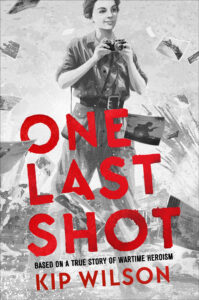Launch: Kip Wilson’s One Last Shot
INTERVIEW BY TRACEY WARR
Kip Wilson’s extraordinary novel in verse form, One Last Shot, is published today. Her previous publications were White Rose (2019, Versify), a critically-acclaimed YA verse novel about anti-Nazi political activist Sophie Scholl, and The Most Dazzling Girl in Berlin (2022, Versify), set in a queer club in Berlin during the last days of the Weimar Republic. Kip holds a PhD in German Literature and is an Associate Editor at Voyage YA.
How would you describe this book and its themes in a couple of sentences?
This book is about Gerda Taro, an enterprising young photojournalist whose passion for capturing the truth led her to take a stand against fascism in Europe in the 1930s. Gerda’s journey brought her to the republican front lines during the Spanish Civil War, where she took incredibly moving photographs of subjects fighting for a cause she very much believed in.
 What are the advantages or disadvantages of basing fiction on real people?
What are the advantages or disadvantages of basing fiction on real people?
I’ve written both about real people (in my debut, White Rose, as well as One Last Shot) and fictional characters (in my sophomore novel, The Most Dazzling Girl in Berlin), so I do enjoy both. One of the aspects I most enjoy about writing about real people is discovering who those people really were and selecting the best details to get that across. Trying to be true to the known facts when information is missing can make it challenging, but I still love it.
What attracted you to this period of history?
I’ve long been attracted to the interwar period (The Most Dazzling Girl in Berlin also takes place in the 1930s), and I’m married to a Spaniard, so I’ve been learning about the turbulent history of Spain at that time for a while. The formation of fascist states in Europe during the 1930s parallels some events in recent years, so this period feels even more relevant these days.
You vividly tell the story of a Jewish family living in Germany in the 1930s, Gerda’s escape to Paris after being interrogated by the Gestapo, and then her work as a photographer in the Spanish Civil War. How important is the role of informing readers about historical events in historical fiction?
The kind of historical fiction I most enjoy (both as a writer and a reader) is the kind steeped in actual historical events. Details that pique my interest range from family life and relationships to the political backdrop. I find including historical events incredibly important, since they help paint an authentic picture of what life was like at the time for my subject. Also, as a writer, they help form the backbone of the story’s plot.
You made the highly unusual choice of writing your story in verse form. What do you feel this form uniquely brings to telling the tale?
My first two novels were also in verse, so it’s actually a more natural form for me! Especially with emotional, hard-hitting subject matter, poetry allows me to get closer to the protagonist, so I really value the form. All three of my novels have been standalone titles, but they all feature female protagonists fighting fascism in some way, and they’re all in verse.
Who is your favourite minor character and why?
I really enjoyed learning more about María Teresa León, who together with her husband Rafael Alberti hosted Gerda during her time in Madrid. María and Rafael were both poets and staunch anti-fascists who supported a wide circle of poets, authors, and artists in Madrid.
Gerda’s story is told in first person. Why did you decide on that point of view?
Verse novels are almost always in first person, and it definitely felt like the most natural to tell Gerda’s story to me. First person allowed me to get deep inside Gerda’s head and heart, and as an individual with so much passion for her cause, it felt like the right decision from the start.
How much did Gerda’s craft as a photographer influence the way that you have written the book? How much did you draw on visual research, including Gerda’s and Robert Capa’s photography? Tell us about The Mexican Suitcase.
Very much! I’m so lucky that many of Gerda’s photographs are available online through the International Center of Photography (ICP). Her biographers were also meticulous in detailing many of her photographs and the conditions under which they were shot. The Mexican Suitcase was not a literal suitcase, but a set of three boxes of negatives shot in Spain by Gerda Taro, her partner Robert Capa, and David Seymour (known as Chim) that were only discovered in Mexico decades after the photographs were considered lost. Before that point, Gerda Taro had been relegated to a footnote in history, especially because Taro and Capa shared cameras, subjects, and a stamp attributing their work. After examining the contents of this “suitcase,” however, experts were able to properly identify and attribute many of Gerda Taro’s significant photographs specifically to her.
 Could you tell us about your publishing process.
Could you tell us about your publishing process.
It’s been different for every project, and I still have my share of not-yet-published novels in my drawer, but in general these days, I like to brainstorm and write a little bit about a project to explore a connection to the subject, and then I begin deeper research. After that, it’s an iterative process for me, with more writing, research, and feedback from critique partners, until I’ve got something that seems viable.
What is your next project and how far advanced is it?
I’m editing an anthology of stories in verse, and I just sent the full draft to the publisher, so it’s definitely starting to feel real. It’s called All the Love Under the Vast Sky, and includes a mix of historical, contemporary, and fantastical stories, each one by a different author. It’ll be hitting shelves in 2024!
What is the last great book you read?
Torch by Lyn Miller-Lachmann.
![]()






